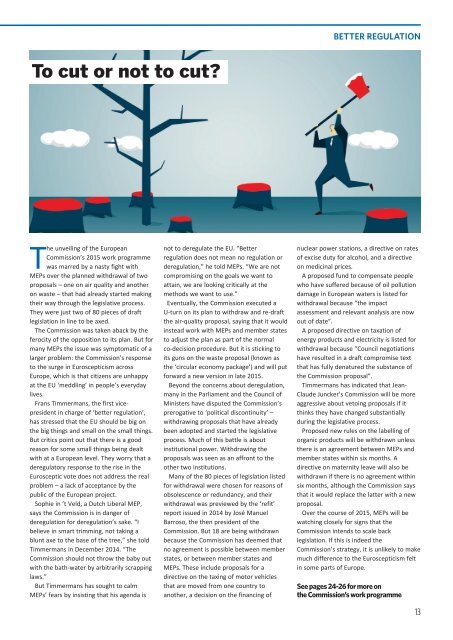Commission-companion-full
Commission-companion-full
Commission-companion-full
Create successful ePaper yourself
Turn your PDF publications into a flip-book with our unique Google optimized e-Paper software.
BETTER REGULATION<br />
To cut or not to cut?<br />
The unveiling of the European<br />
<strong>Commission</strong>’s 2015 work programme<br />
was marred by a nasty fight with<br />
MEPs over the planned withdrawal of two<br />
proposals – one on air quality and another<br />
on waste – that had already started making<br />
their way through the legislative process.<br />
They were just two of 80 pieces of draft<br />
legislation in line to be axed.<br />
The <strong>Commission</strong> was taken aback by the<br />
ferocity of the opposition to its plan. But for<br />
many MEPs the issue was symptomatic of a<br />
larger problem: the <strong>Commission</strong>’s response<br />
to the surge in Euroscepticism across<br />
Europe, which is that citizens are unhappy<br />
at the EU ‘meddling’ in people’s everyday<br />
lives.<br />
Frans Timmermans, the first vicepresident<br />
in charge of ‘better regulation’,<br />
has stressed that the EU should be big on<br />
the big things and small on the small things.<br />
But critics point out that there is a good<br />
reason for some small things being dealt<br />
with at a European level. They worry that a<br />
deregulatory response to the rise in the<br />
Eurosceptic vote does not address the real<br />
problem – a lack of acceptance by the<br />
public of the European project.<br />
Sophie in ’t Veld, a Dutch Liberal MEP,<br />
says the <strong>Commission</strong> is in danger of<br />
deregulation for deregulation’s sake. “I<br />
believe in smart trimming, not taking a<br />
blunt axe to the base of the tree,” she told<br />
Timmermans in December 2014. “The<br />
<strong>Commission</strong> should not throw the baby out<br />
with the bathwater by arbitrarily scrapping<br />
laws.”<br />
But Timmermans has sought to calm<br />
MEPs’ fears by insisting that his agenda is<br />
not to deregulate the EU. “Better<br />
regulation does not mean no regulation or<br />
deregulation,” he told MEPs. “We are not<br />
compromising on the goals we want to<br />
attain, we are looking critically at the<br />
methods we want to use.”<br />
Eventually, the <strong>Commission</strong> executed a<br />
Uturn on its plan to withdraw and redraft<br />
the airquality proposal, saying that it would<br />
instead work with MEPs and member states<br />
to adjust the plan as part of the normal<br />
codecision procedure. But it is sticking to<br />
its guns on the waste proposal (known as<br />
the ‘circular economy package’) and will put<br />
forward a new version in late 2015.<br />
Beyond the concerns about deregulation,<br />
many in the Parliament and the Council of<br />
Ministers have disputed the <strong>Commission</strong>’s<br />
prerogative to ‘political discontinuity’ –<br />
withdrawing proposals that have already<br />
been adopted and started the legislative<br />
process. Much of this battle is about<br />
institutional power. Withdrawing the<br />
proposals was seen as an affront to the<br />
other two institutions.<br />
Many of the 80 pieces of legislation listed<br />
for withdrawal were chosen for reasons of<br />
obsolescence or redundancy, and their<br />
withdrawal was previewed by the ‘refit’<br />
report issued in 2014 by José Manuel<br />
Barroso, the then president of the<br />
<strong>Commission</strong>. But 18 are being withdrawn<br />
because the <strong>Commission</strong> has deemed that<br />
no agreement is possible between member<br />
states, or between member states and<br />
MEPs. These include proposals for a<br />
directive on the taxing of motor vehicles<br />
that are moved from one country to<br />
another, a decision on the financing of<br />
nuclear power stations, a directive on rates<br />
of excise duty for alcohol, and a directive<br />
on medicinal prices.<br />
A proposed fund to compensate people<br />
who have suffered because of oil pollution<br />
damage in European waters is listed for<br />
withdrawal because “the impact<br />
assessment and relevant analysis are now<br />
out of date”.<br />
A proposed directive on taxation of<br />
energy products and electricity is listed for<br />
withdrawal because “Council negotiations<br />
have resulted in a draft compromise text<br />
that has <strong>full</strong>y denatured the substance of<br />
the <strong>Commission</strong> proposal”.<br />
Timmermans has indicated that Jean<br />
Claude Juncker’s <strong>Commission</strong> will be more<br />
aggressive about vetoing proposals if it<br />
thinks they have changed substantially<br />
during the legislative process.<br />
Proposed new rules on the labelling of<br />
organic products will be withdrawn unless<br />
there is an agreement between MEPs and<br />
member states within six months. A<br />
directive on maternity leave will also be<br />
withdrawn if there is no agreement within<br />
six months, although the <strong>Commission</strong> says<br />
that it would replace the latter with a new<br />
proposal.<br />
Over the course of 2015, MEPs will be<br />
watching closely for signs that the<br />
<strong>Commission</strong> intends to scale back<br />
legislation. If this is indeed the<br />
<strong>Commission</strong>’s strategy, it is unlikely to make<br />
much difference to the Euroscepticism felt<br />
in some parts of Europe.<br />
See pages 24-26 for more on<br />
the <strong>Commission</strong>’s work programme<br />
13


